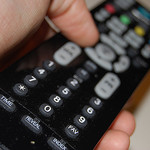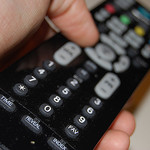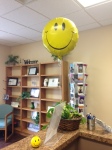
We all love a good top ten, so here’s my list on signs of hearing loss, which is typical for almost all who experience hearing difficulty. Don’t be shy; It’s okay to admit if you didn’t hear the microwave beep a half hour ago. That’s why we’re here. Let’s begin:
10) The TV remote control volume indicator doesn’t seem to go beyond 82 
You see your children walk past you in the living room daily—with pilot earmuffs on. Unless they’re training to be aviators, this may be a good indicator a hearing test is in your future.
9) “I’m sorry, can you repeat that?”
You have gotten used to the very irritated faces of those who are annoyed in having to repeat their long “and my fish was this big” story.
8) Women and children first!
We’re not throwing out life preservers here. In the world of audiology, the voices of women and children go first in hearing loss. Now, hubbies out there…please…show some restraint in excitement here.
7) You have gotten pretty good at playing Scrabble

You hear maybe three out of every five words in a conversation. The rest of the time—while the speaker is busy going off on a tangent about how her hair doesn’t seem to do what she wants it to do anymore—you’re busy trying to fill in the two blanks on what she said that was actually important.
6) You have recently decided to become a hermit
You’ve heard the saying, “silence is golden”, but it’s not precious when you inflict it on yourself, because you know you won’t be able to participate in conversations. Missing your son’s wedding is out of the question. You begin to contemplate ways in which to avoid the over-crowded loud reception hall and dodge all the round tables filled with indecipherable chatter. This may be a good indicator to step in to your audiologist’s office for a test. You’d be surprised what technology can do.
5) You swear you can read even a ventriloquist’s lips
You’ve been known to browse through Facebook posts and “watch” the video clips without even opening it up to actually listen to the audio. You’ve just gotten that good at lip-reading. Everybody reads lips to augment speech understanding. Those with hearing loss, however, rely more on lip-reading as their primary source of speech understanding. Nothing gets past you; you put the ventriloquist out of a job. This may be good; they are a little creepy.
4) If you could pick the word of the year, it would be…”Huh?” or “What?”
“Huh?”….I can still remember my mother correcting me when I was a child that using “huh” in conversation was “rude.” Nevertheless, “huh” became a staple in my word diet. Is it in yours? “Huh” lines right up there in the part of the food pyramid where the doughnuts can be found….What do you mean doughnuts aren’t in the food pyramid? I’ve been living a lie all these years…
3) You hear Jingle Bells year-round 
Let’s face it: Jingle Bells should only be heard one month out of the year. When you hear your ears ringing (buzzing, rushing water, or even motor sounds–all sounds of tinnitus) any other time, it’s time to see your audiologist. Tinnitus is typically found with hearing loss. Seek out your audiologist to explain the maddening noise in order to find relief. Over fifty million people experience tinnitus; More than half of them have an associated hearing loss.
2) “Would you like some thighs with that?”
Perhaps it was just subliminal that I heard it that way. But no, throw in the fries I say! …and then I remember to put in my hearing aids to avoid further misinterpretations.
And last, but never least…
1) Ha ha ha ha ha!….Wait, what am I laughing at? 
You are the last to know the punchline of a joke, but you laugh anyway. It’s certainly no fun when someone has to repeat it after everyone has already laughed and moved on.
PLEASE SHARE!
 Kiersten Troutman is the Manager of Marketing and Outreach at HEARINC. She holds a Bachelor of Arts degree from Kent State University, and is finishing up her Master of Arts degree in English from The University of Akron. She herself suffers unilateral hearing loss from birth and has a true appreciation for the audiological advances made in the assistive hearing device industry. She has a passion for helping others realize these advances, and has a vision to educate the public on how quality of life can often be improved by simply taking advantage of the current technology available.
Kiersten Troutman is the Manager of Marketing and Outreach at HEARINC. She holds a Bachelor of Arts degree from Kent State University, and is finishing up her Master of Arts degree in English from The University of Akron. She herself suffers unilateral hearing loss from birth and has a true appreciation for the audiological advances made in the assistive hearing device industry. She has a passion for helping others realize these advances, and has a vision to educate the public on how quality of life can often be improved by simply taking advantage of the current technology available.
HEARINC. Join the Conversation.
Copyright. Kiersten D. Troutman. 2014.








You must be logged in to post a comment.